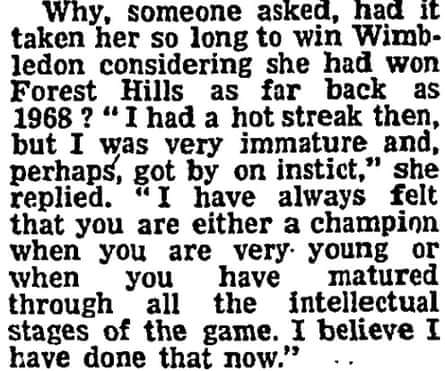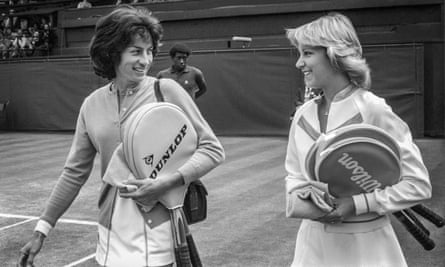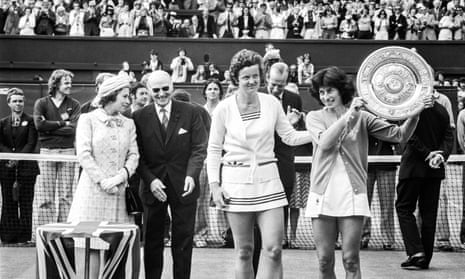The Guardian and Observer reported that Virginia Wade beat Betty Stöve of the Netherlands 4-6, 6-3, 6-1. This was a historic year as it was the tournament’s centenary and the Queen’s Silver Jubilee.
In the Guardian David Irvine’s congratulatory article about Virginia Wade’s historic win described the atmosphere on Centre Court. He said it was like the last night of the Proms, with the crowd singing a rousing version of Land of Hope and Glory. “At the end the cheers were loud and deafening.” A Wimbledon champion at last Wade agreed: “It was like a fairy-tale, with everyone cheering for the Queen and cheering for me.”

The full article can be read here
In that summer of 1977 two British women had reached the Wimbledon semi-finals; Virginia Wade and Sue Barker. It appeared that Wade had the tougher route to the final as her opponent was American reigning champion, Chris Evert, whereas Barker faced Betty Stöve from the Netherlands, who although number 5 in the world, was more successful as a doubles player.
Wade had been ranked in the world’s top 10 since 1967 and was world number 2 in 1975, reaching the Wimbledon semi-finals in 1974 and 1976.
During the days leading up to the final articles were written recording Wade’s progress through the tournament. The hopes for the competition were always tempered with reservations. Even when Wade and Barker reached the semi-finals journalist David Irvine remarked that they had progressed “with a nerveless ease that was in marked contrast to the jumpy uncertainty and draining confidence that customarily overwhelms our heroines when the prospect of glory beckons.” He also reported however, that Wade almost sensed a sort of destiny with this historic tournament when she said: “I think I have the willpower and guts to win this tournament – and that’s what I intend to do.”
In his article of 30 June Irvine reports on Wade’s defeat of the American favourite, Chris Evert, in the semi-final. He said that Wade herself had believed that she would never have a better chance of winning than in Jubilee year. The tournament had been the focus of her whole year. Evert remarked: “I could see it in her eyes that she really wanted to win.” Wade gave credit to American coach, Ham Richardson, who had helped improve the efficiency of her game after he told her that he had never seen anyone use so much energy for so little gain.

Wade had grown up in South Africa, where her father was Archdeacon of Durban. She learnt to play tennis there and continued to play successfully when she returned to England in 1960 aged 15 at Tunbridge Wells High School. Virginia surprised her teachers with her forthright and competitive approach to the game. One remarked that she had “never seen so many rackets flying round the locker room.”
Wade had arrived back in England at the end of the best decade post-war for British women’s tennis following the likes of Angela Mortimer, who won Wimbledon in 1961 and Ann Jones who was the 1969 winner.
Whilst Wade had achieved great success winning the US Open in 1968 and the Australian Open in 1972 she felt that having reached two Wimbledon semi-finals she still had much to prove.
Frank Keating’s article the day after Wade’s win described her preparation for the final and emphasised her focus and determination throughout the tournament. She had never despaired. She had felt that she was the best player in the world not to have won Wimbledon and this self belief had carried her through to the end.
Reflecting on the historic win on Sunday 3 July in a profile piece in the Observer Christopher Brasher noted that Virginia Wade had had a classic English amateur attitude to sport. Having stated that she did not think she had the mental capacity to play week after week she had been transformed by playing with the New York Apples, in the American inter-cities tennis league. She said that this experience improved her confidence. American influence seems to have played an integral part in Wade’s preparation for her Wimbledon success. After her 1976 loss at the semi-finals American Billy Jean King had advised that she needed to start preparing immediately. Alongside support from American tennis player, Ham Richardson, she had also received help from American coach, Jerry Teeguarden. She commented: “He’s taught me that tennis is a thinking girl’s game.”
Other reflections on Virginia Wade’s Wimbledon win can be found in the Guardian’s From the archive and Pass Notes
There is also a Q&A with Virginia Wade and an interview with Stephen Moss
How to access past articles from the Guardian and the Observer newspapers
